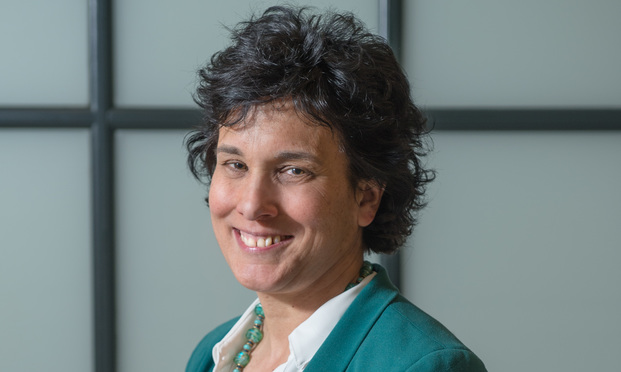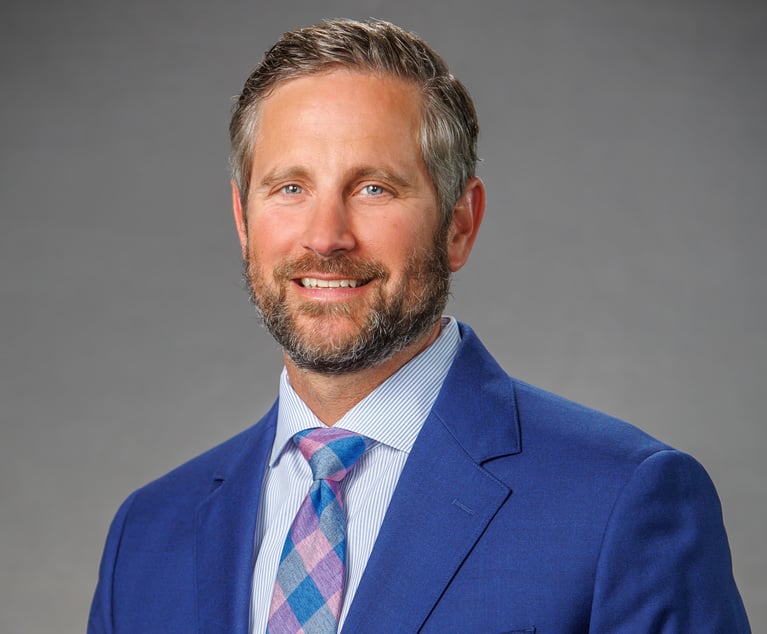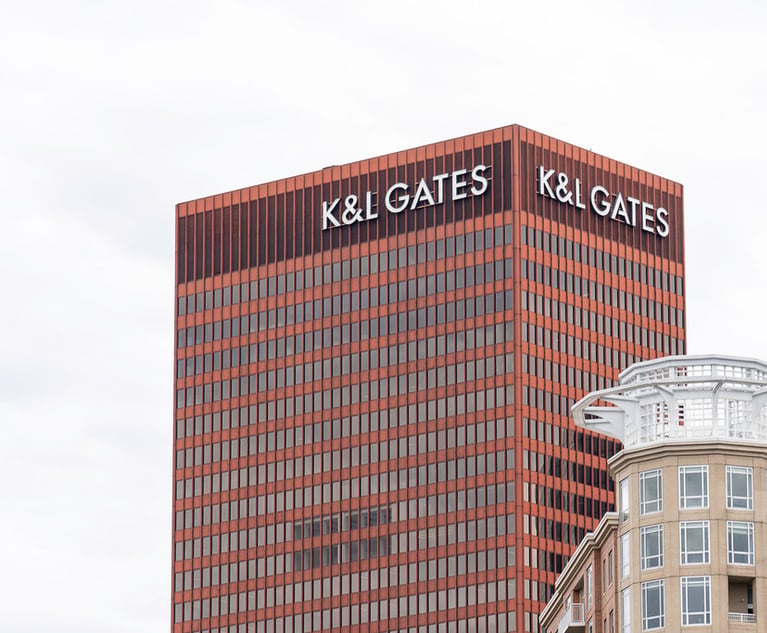Lawyers Honor National Professional Social Workers Month
During the public health crisis posed by the coronavirus, our social workers' expertise is especially critical as we develop disaster office operation plans and maintain our commitment to serve the people who will be most affected by this crisis.
March 20, 2020 at 01:33 PM
7 minute read
 Susan Vivian Mangold, Juvenile Law Center
Susan Vivian Mangold, Juvenile Law CenterDuring National Professional Social Workers' Month, let's honor the social workers who are so critical to our public interest law community in Philadelphia. The public interest law offices in Philadelphia work closely with our social work staff to provide counseling, case management, program management, and a myriad of other services critical to our work. At Juvenile Law Center, social work staff are also important partners in our policy reform efforts. During the public health crisis posed by the coronavirus, our social workers' expertise is especially critical as we develop disaster office operation plans and maintain our commitment to serve the people who will be most affected by this crisis.
At Juvenile Law Center, we have two MSW-level social workers who manage our youth advocacy program and are critical to our policy work in many project areas. Each year, our youth advocacy program hires youth with experience in the foster care system and the justice system to work with us for one to three years on annual projects to reform the systems that have had such a profound impact on their lives. Our social workers manage all this work, contributing to our reform work in the child welfare and justice systems here in Philadelphia and around the country.
Having social workers work alongside attorneys poses unique issues. What is the role of the social worker in a law office? What does their case participation mean for attorney-client privilege? Do we think differently about their role as mandated reporters of abuse? Partnership with social workers requires us to grapple with these issues alongside the social work professionals who operate under their own strict code of ethics and professional responsibility, enhancing intra-office policies with a client-centered approach. While many attorneys may be trained in trauma-informed advocacy, our social workers are experts in conducting all work with a trauma-informed approach.
At Juvenile Law Center, our social workers also work alongside us in our policy work. Two years ago, Juveniles for Justice published "Broken Bridges: How Juvenile Placements Cut Off Youth From Communities and Successful Futures." That report culminated the youth advocates' year-long project on conditions of confinement for youth in the justice system. They detailed abusive practices like solitary confinement and strip searches. They poignantly described the harms they experienced when they lost contact with loved ones and faced education deprivations. Our social workers not only prepared our youth advocates to present their findings to Philadelphia City Council, they also worked with the youth advocates to develop policy recommendations to change these harmful practices. Their testimony was a leading driver to the formation of the Youth Placement Residential Task Force. The final report of that task force lays out an agenda for Philadelphia juvenile justice and child welfare reform.
Our subsequent legal work has been informed by the youth perspectives our social workers helped to highlight. In our class action lawsuit over the abusive conditions at Glen Mills, we are litigating the very conditions the youth raised in "Broken Bridges." Our subsequent report, "Transforming Justice: Bringing Pennsylvania's Young People Safely Home From Juvenile Justice Placements," again incorporated youth insights and perspectives as we shaped our asks and defined a blueprint for reform at the state level. All of these efforts are now feeding into a state-level reform effort focused on moving youth out of placement and back into their homes and communities; our social workers are vital to our efforts to center our legal work in the voices and insights of youth.
Social workers are especially critical in times of crises, to provide the trauma-informed expertise to advise offices on our responses and to deliver needed services. At this time, the coronavirus is stressing all of us to consider our workplace risk and operations. For public interest law offices, we concurrently consider the people we represent who are the most vulnerable in challenging times. SeniorLAW Center and Homeless Advocacy Project serve clients most vulnerable from the coronavirus; Support Center for Child Advocates partners social workers with attorneys every day to protect the rights and well-being of children in the child welfare system. Every agency member of the Delivery of Legal Services Committee is working to protect our staff while we elevate the needs of our clients.
Youth in the child welfare and justice systems are especially vulnerable when emergencies strike. Youth in placement need to be protected from contagious disease that can sweep through institutional settings. Foster homes will be stressed like all families to protect immediate and extended family from illness. As colleges and universities close, youth with no homes to return to are suddenly without a safe residence despite all their work to get themselves into college. Our youth advocates published "Achieving Success: Guidance for Colleges to Better Support Foster Youth," a set of recommendations for colleges and universities to meet the needs of youth in foster care.
Our social workers are playing a key role in ensuring that the youth who work with us have what they need in this time of crisis and we have emergency funds available to them to assist our youth advocates. As we move our office to remote access, we want to ensure the youth advocates we work with are able to continue their advocacy efforts and be compensated accordingly. Additionally, we want to ensure that they are able to continue receiving as much support as possible from our program staff. Two years ago, we established an emergency fund for our social workers to meet immediate needs of our youth advocates. That flexible funding is even more critical now. Here are some of the ways we are providing additional support during this public health crisis and urge our colleagues to do the same and share their additional plans:
- Paying all youth advocates for any meetings cancelled as a result of current disruptions.
- Updating all addresses for youth advocates so their checks can be mailed out. We have identified with each youth advocate the best way to obtain their compensation.
- Conducting our weekly workshops and individual youth meetings virtually. We have discussed with each youth advocate how they can personally continue their participation. They will continue to be compensated for this meeting time as they are for the in-person meetings.
- Reviewing with each youth advocate what measures they should take in regard to keeping themselves healthy.
- Establishing with our program interns the best way to work remotely in light of universities closing and continue our supervision of them.
- Updating all forms of contact and communication with each youth advocate to make sure that we can reach out to them and they can reach out to us.
- Placing typed notices outside of our office doors with instructions for youth on how to get in contact with us during this time.
- Addressing specialized transportation needs for each individual youth.
As a community, we face a public health crisis and response that is unique in our lifetimes. Our social workers are a critical partner in this work both in our intra-office response and in our continuing work. It is fitting during National Professional Social Workers Month to applaud the work of our social work partners on our public interest law staffs. They make our offices and our community safer, stronger and more humane.
Susan Vivian Mangold is chief executive officer at Juvenile Law Center. She is proud to work alongside team members Marcía Hopkins and Cathy Moffa, the exceptional social workers at Juvenile Law Center.
This content has been archived. It is available through our partners, LexisNexis® and Bloomberg Law.
To view this content, please continue to their sites.
Not a Lexis Subscriber?
Subscribe Now
Not a Bloomberg Law Subscriber?
Subscribe Now
NOT FOR REPRINT
© 2025 ALM Global, LLC, All Rights Reserved. Request academic re-use from www.copyright.com. All other uses, submit a request to [email protected]. For more information visit Asset & Logo Licensing.
You Might Like
View All

Products Liability: The Absence of Other Similar Claims—a Defense or a Misleading Effort to Sway a Jury?


K&L Gates Sheds Space, but Will Stay in Flagship Pittsburgh Office After Lease Renewal
Trending Stories
- 1'It's Not Going to Be Pretty': PayPal, Capital One Face Novel Class Actions Over 'Poaching' Commissions Owed Influencers
- 211th Circuit Rejects Trump's Emergency Request as DOJ Prepares to Release Special Counsel's Final Report
- 3Supreme Court Takes Up Challenge to ACA Task Force
- 4'Tragedy of Unspeakable Proportions:' Could Edison, DWP, Face Lawsuits Over LA Wildfires?
- 5Meta Pulls Plug on DEI Programs
Who Got The Work
Michael G. Bongiorno, Andrew Scott Dulberg and Elizabeth E. Driscoll from Wilmer Cutler Pickering Hale and Dorr have stepped in to represent Symbotic Inc., an A.I.-enabled technology platform that focuses on increasing supply chain efficiency, and other defendants in a pending shareholder derivative lawsuit. The case, filed Oct. 2 in Massachusetts District Court by the Brown Law Firm on behalf of Stephen Austen, accuses certain officers and directors of misleading investors in regard to Symbotic's potential for margin growth by failing to disclose that the company was not equipped to timely deploy its systems or manage expenses through project delays. The case, assigned to U.S. District Judge Nathaniel M. Gorton, is 1:24-cv-12522, Austen v. Cohen et al.
Who Got The Work
Edmund Polubinski and Marie Killmond of Davis Polk & Wardwell have entered appearances for data platform software development company MongoDB and other defendants in a pending shareholder derivative lawsuit. The action, filed Oct. 7 in New York Southern District Court by the Brown Law Firm, accuses the company's directors and/or officers of falsely expressing confidence in the company’s restructuring of its sales incentive plan and downplaying the severity of decreases in its upfront commitments. The case is 1:24-cv-07594, Roy v. Ittycheria et al.
Who Got The Work
Amy O. Bruchs and Kurt F. Ellison of Michael Best & Friedrich have entered appearances for Epic Systems Corp. in a pending employment discrimination lawsuit. The suit was filed Sept. 7 in Wisconsin Western District Court by Levine Eisberner LLC and Siri & Glimstad on behalf of a project manager who claims that he was wrongfully terminated after applying for a religious exemption to the defendant's COVID-19 vaccine mandate. The case, assigned to U.S. Magistrate Judge Anita Marie Boor, is 3:24-cv-00630, Secker, Nathan v. Epic Systems Corporation.
Who Got The Work
David X. Sullivan, Thomas J. Finn and Gregory A. Hall from McCarter & English have entered appearances for Sunrun Installation Services in a pending civil rights lawsuit. The complaint was filed Sept. 4 in Connecticut District Court by attorney Robert M. Berke on behalf of former employee George Edward Steins, who was arrested and charged with employing an unregistered home improvement salesperson. The complaint alleges that had Sunrun informed the Connecticut Department of Consumer Protection that the plaintiff's employment had ended in 2017 and that he no longer held Sunrun's home improvement contractor license, he would not have been hit with charges, which were dismissed in May 2024. The case, assigned to U.S. District Judge Jeffrey A. Meyer, is 3:24-cv-01423, Steins v. Sunrun, Inc. et al.
Who Got The Work
Greenberg Traurig shareholder Joshua L. Raskin has entered an appearance for boohoo.com UK Ltd. in a pending patent infringement lawsuit. The suit, filed Sept. 3 in Texas Eastern District Court by Rozier Hardt McDonough on behalf of Alto Dynamics, asserts five patents related to an online shopping platform. The case, assigned to U.S. District Judge Rodney Gilstrap, is 2:24-cv-00719, Alto Dynamics, LLC v. boohoo.com UK Limited.
Featured Firms
Law Offices of Gary Martin Hays & Associates, P.C.
(470) 294-1674
Law Offices of Mark E. Salomone
(857) 444-6468
Smith & Hassler
(713) 739-1250





